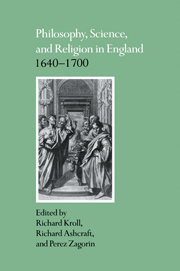Preface
Published online by Cambridge University Press: 05 November 2011
Summary
The essays collected in this volume were originally presented at a four-day conference held at the William Andrews Clark Memorial Library, Los Angeles. The Clark Library is one of the finest collections extant of rare books and manuscripts from the period 1640 to 1750, providing an ideal setting. It was also appropriately the place where the conference originated. A forum for reappraising the English latitudinarians was the brainchild of Richard H. Popkin, whose History of Scepticism from Erasmus to Spinoza could be said to inform much of what follows. During the 1982–83 academic year, Richard Popkin served as the Clark Professor; and in that context he proposed the idea to two Clark Library Fellows, James E. Force and Richard Kroll, who subsequently organized and ran the conference under the rubric, “Latitudinarianism, science, and society.”
We now entitle this collection, representing a sample of some of the papers read at the conference, Philosophy, Science, and Religion in England, 1640–1700. The change of title occurs for two reasons. It responds to those academic constraints which might lead a reader to suppose that a volume discussing latitudinarianism is narrowly engaged in theological disputes, whereas the topic necessarily engages much broader cultural and intellectual issues, affecting our general interpretation of the Interregnum and Restoration. The second reason is intrinsic to the nature of the debate about latitudinarianism both as it occurs within seventeenth-century historiography and as it developed through four days of a California spring. Richard Kroll's introduction suggests that it became increasingly evident to all the participants that the debate surrounding latitudinarianism eventually translates into the question of how best to describe cultural change and cultural practice between 1640 and 1700.
- Type
- Chapter
- Information
- Philosophy, Science, and Religion in England 1640–1700 , pp. xiii - xviPublisher: Cambridge University PressPrint publication year: 1992



